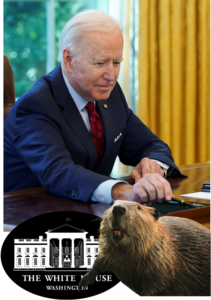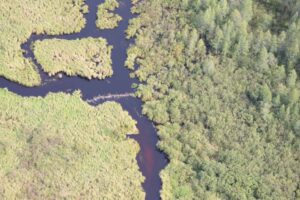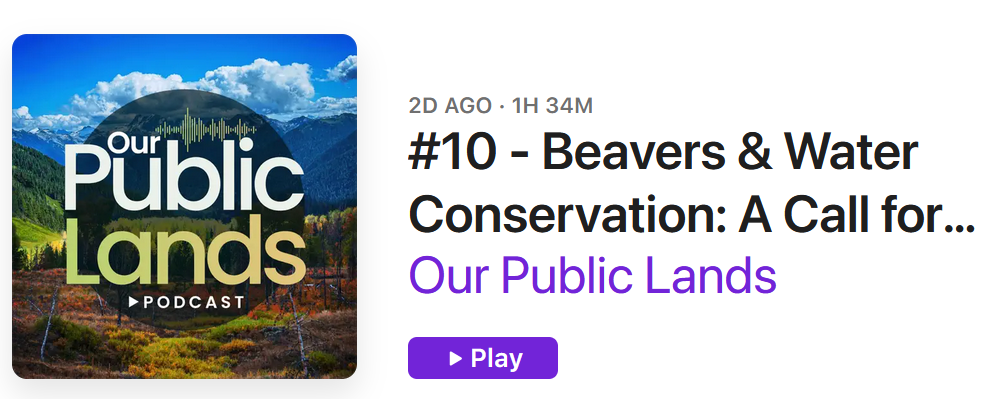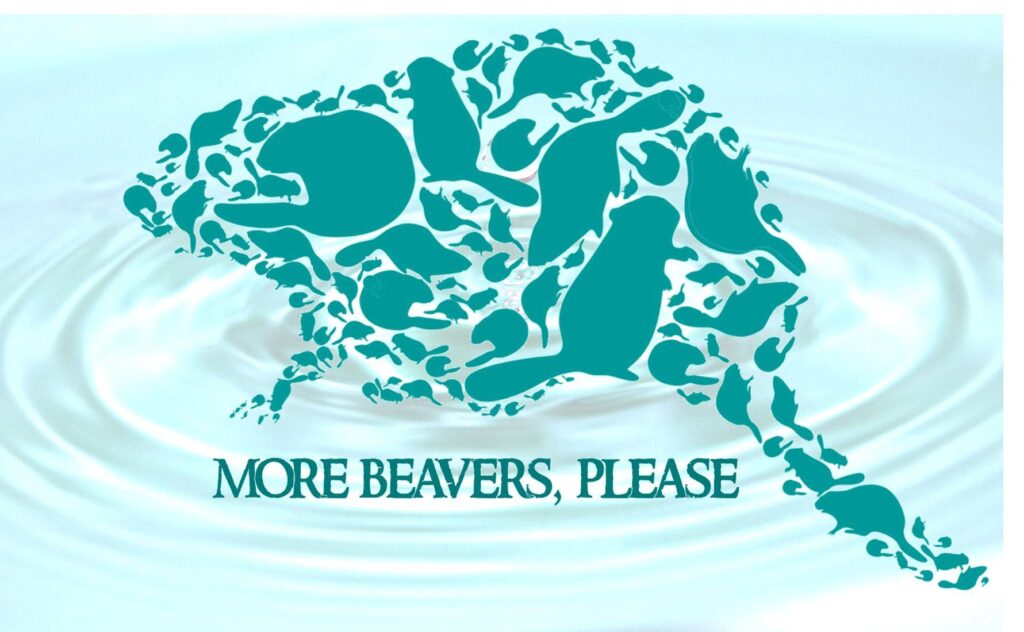This is unbelievable. It’s been days since there was a significant beaver news story and this morning there are two stories of exact opposite dramatic weight. Neither one can wait until tomorrow. There’s no alternative, you must hear about BOTH of them. The best of times and the worst of times. The zenith and the nadir. The story we’ve all been waiting for and the story that we’ve never expected to read.
My only love sprung from my only hate, said Juliet. I can’t do a split screen but let’s just look at the headlines side by side, shall we?


Lest you think I exaggerate YES that headline says President Biden and YES that other headline is from The FRIGGIN’ WILDLIFE SOCIETY. So you can see my dilemma. Let’s start with the good news. It will give us strength for the other part.
by Western Watersheds Project
 Yesterday, this letter was delivered to President Biden requesting an executive order protecting beaver on federally managed public lands. “In order to fully realize the wide array of social, ecological, and economic benefits that beavers provide to human and wild communities, the federal government must take bold and decisive action,” said Adam Bronstein of Western Watersheds Project. “This executive order would provide clear direction and is needed because state wildlife agencies are too narrowly focused on the interest of hunters and trappers, leading to their continued failure to protect this critical keystone species. Anxieties are high and cut across state boundaries and addressing them requires a national strategy rather than a piecemeal approach.”
Yesterday, this letter was delivered to President Biden requesting an executive order protecting beaver on federally managed public lands. “In order to fully realize the wide array of social, ecological, and economic benefits that beavers provide to human and wild communities, the federal government must take bold and decisive action,” said Adam Bronstein of Western Watersheds Project. “This executive order would provide clear direction and is needed because state wildlife agencies are too narrowly focused on the interest of hunters and trappers, leading to their continued failure to protect this critical keystone species. Anxieties are high and cut across state boundaries and addressing them requires a national strategy rather than a piecemeal approach.”
Why are beavers so important? Beavers and — the habitats they create — sequester vast amounts of carbon, provide vital habitat for fish and wildlife, create natural firebreaks, filter drinking water, store water during drought and temper flooding events. When beavers are removed from the landscape, these important benefits are lost. Beavers nearly went extinct in North America after centuries of fur trapping and extermination efforts and their populations have yet to recover across most areas of the United States. Protecting beavers by closing public lands to beaver trapping and hunting will vastly improve survival rates.
Suzanne Fouty wrote me weeks ago about this being in the works and Worth A Dam is a signatory to the letter but it’s nice to see the headline. The attached letter is a wonderful read and the signatories below are like a who’s who in the beaver world. Of course you know me, I wish it said something about killing beavers for other reasons like blockign culverts, but it’s a start and we all have our own fish to fry.
“Beavers are a keystone species, meaning that they play a crucial role in maintaining the biodiversity and stability of ecosystems,” adds Dr. William Ripple, Distinguished Professor of Ecology at Oregon State University. “Beavers have been referred to as ‘nature’s firefighters’ due to their ability to create wetland habitats that can act as natural firebreaks, slowing or even stopping the spread of wildfires.”
And as weather becomes increasingly unpredictable and severe and the economic, ecological, and emotional costs rise, we need all the help we can get. Long-time environmental advocate and singer/songwriter Carole King summed up the reality of the situation, “No matter how far downstream we live, beavers and their dams are beneficial to all of us because they create wetlands, mitigate drought and flooding, and filter pollutants from our rivers and streams.”
Nicely said. Beavers do a lot of things for the country that you say you want done. So lets not kill them. Except of course for in Michigan and Wisconsin where they degrade habitat and pollute our streams. How’s the whiplash coming along? This is from article II:
Beaver dams are a major cause of habitat degradation in the streams that drain into Lake Superior, Lake Huron and Lake Michigan. While beaver ponds can be beneficial to some species of wildlife, obstructions on these small tributaries can negatively impact critical habitat for migrating fish, including brook trout, particularly during spawning season. A single obstruction has the potential to impact fish passage over miles of the stream and can disrupt gravel stream bottoms necessary for successful spawning, decrease stream flow causing lower oxygen levels and negatively increase water temperature.
 We expect malarkey like this from USDA. I mean goodness what else are they likely to do. But to read this report in THE WILDLIFE SOCIETY? Honest TWS has done some of the best and earliest beaver education in the country. In fact way back when the Martinez beavers were in danger I remember one of my most hopeful moments was when fellow committee member Igor Skaredoff attended a TWS beaver conference in Oregon. I expect better from them. Good lord.
We expect malarkey like this from USDA. I mean goodness what else are they likely to do. But to read this report in THE WILDLIFE SOCIETY? Honest TWS has done some of the best and earliest beaver education in the country. In fact way back when the Martinez beavers were in danger I remember one of my most hopeful moments was when fellow committee member Igor Skaredoff attended a TWS beaver conference in Oregon. I expect better from them. Good lord.
 Wildlife Services coordinated with the Michigan and Wisconsin departments of natural resources to identify stream locations that represented traditional coaster brook trout habitat. Staff then surveyed designated streams on foot, watercraft and fixed-wing aircraft to identify stream barriers. After locating beaver activity and dams through surveying, barriers were removed using a combination of hand pulling and explosives.
Wildlife Services coordinated with the Michigan and Wisconsin departments of natural resources to identify stream locations that represented traditional coaster brook trout habitat. Staff then surveyed designated streams on foot, watercraft and fixed-wing aircraft to identify stream barriers. After locating beaver activity and dams through surveying, barriers were removed using a combination of hand pulling and explosives.
 From 2018 to 2021, where the goal was to protect areas of coastal wetland and other habitats in Michigan, Wildlife Services staff monitored targeted areas along 19 streams, surveying approximately 200 acres and removing 120 beaver dams. During the same timeframe, Wildlife Services staff in Wisconsin worked to maintain stream connectivity established for aquatic species. Wisconsin Wildlife Services staff monitored targeted areas along 32 streams, spanning just over 300 miles, and removed a total of 225 beaver dams.
From 2018 to 2021, where the goal was to protect areas of coastal wetland and other habitats in Michigan, Wildlife Services staff monitored targeted areas along 19 streams, surveying approximately 200 acres and removing 120 beaver dams. During the same timeframe, Wildlife Services staff in Wisconsin worked to maintain stream connectivity established for aquatic species. Wisconsin Wildlife Services staff monitored targeted areas along 32 streams, spanning just over 300 miles, and removed a total of 225 beaver dams.
We are living in times of feast and times of famine. The best of times and the worst of times. The beaver renaissance and the beaver dark ages. It ain’t over until it’s over, Your help is still need.
Stay vigilant.



















































